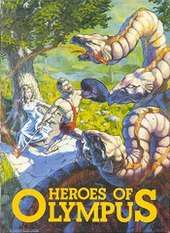Heroes of Olympus (role-playing game)
Description
Heroes of Olympus is a fantasy system set in the heroic age of ancient Greece.[1] The player characters are Argonauts, adventurers in the crew of the hero Jason.[1] The rules cover the backgrounds and abilities of the Argonauts, character improvement, combat (including rules for trickery), sailing, magic, nonhuman races, the gods, and how to run a campaign.[1] The set comes with four scenarios (with a color map for each), including the Golden Fleece, and encounters with the Harpies and Clashing Rocks.[1]
Heroes of Olympus is based on Greek mythology and players either take on the roles of Argonauts in Jason's crew or else make their own heroes using point-based character creation.[2] The game includes two tactical combat systems for melee and a naval combat system, and was an attempt to bring together elements from roleplaying games, board games and wargames.[2]
The 2nd edition adds some sample miniatures and an article from Different Worlds for adapting the characters to Thieves' World.[1]
Publication history
Heroes of Olympus was written by B. Dennis Sustare, and published by Task Force Games in 1981.[2] It was a boxed set with an orange cover, containing a 56-page book, five maps, two cardboard counter sheets, and dice.[1] Heroes of Olympus was the first of a number of pseudo-RPGs that Task Force Games produced, of the sort that were also appearing at other wargaming companies such as SPI's DragonQuest and Metagaming Concepts's The Fantasy Trip.[2] Heroes of Olyumpus was supported by a pair of magazine articles, and did earn a second edition in 1983.[2] The second edition was a larger boxed set with a cover by Chris White, containing a 56-page book, a pamphlet, five maps, counters, metal miniatures, and dice.[1]
Reception
According to Shannon Appelcline, although the game had elements of roleplaying games, board games and wargames, "it was probably as much of a roleplaying game as other RPGs from the same time period," such as DragonQuest and The Fantasy Trip.[2]
Reviews
- Different Worlds #30 (Sept., 1983)
References
- Schick, Lawrence (1991). Heroic Worlds: A History and Guide to Role-Playing Games. Prometheus Books. p. 73. ISBN 0-87975-653-5.
- Shannon Appelcline (2011). Designers & Dragons. Mongoose Publishing. p. 115. ISBN 978-1-907702-58-7.
